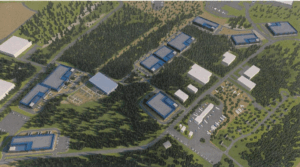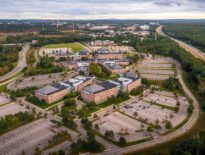
An aerial rendering of the proposed Westfield data center campus, as Servistar Realties pitched it in 2021. Image courtesy of Servistar Realties | Screenshot
Hard times are once again knocking on our door.
Massachusetts is at a high risk of recession and may already be in the early stages of a contraction, according to economist Mark Zandi.
Our jobless rate, at 4.8 percent, is also higher than the national average.
So, is this really the right time for the Bay State to indulge in green virtue-signaling and turn up its nose at the AI-driven boom in data center construction?
Gov. Maura Healey should seriously ponder just that question as local environmental justice activists blast a tax break aimed at giving our state a piece of all that data center construction action.
Billions upon billions of dollars in new data centers are under construction in states across the country, employing tens of thousands of construction workers at a time when other sources of construction jobs were waning, thanks to the bad economics of new real estate developments.
But none here.
And apparently, the Conservation Law Foundation and a fellow Boston-based environmental justice group are determined to keep it that way.
Environmental Justice Concerns
Downtown-headquartered CLF and Roxbury-based Alternatives for Community and Environment are raising concerns with state officials about plans for a new state tax incentive aimed at boosting the construction of new data centers in Massachusetts.
Big data centers would be spared from having to fork over tens of millions in state sales and use taxes under the new rules, which cleared the Legislature last year.
And the tax break is considered to be the missing ingredient needed to help plans for a $3 billion data center in the works in the old manufacturing city of Westfield, potentially saving it $30 million a year, per The Boston Globe.
Once it is fully built out over the next decade, the data center will create as many as 2,000 construction jobs and 400 full-time jobs, State House News Service reports.
But where local and state leaders see a potential boon to development in economically struggling Western Massachusetts, CLF and Alternatives for Community and Environment see an environmental mess in the making.
In a statement, Tristan Thomas, policy director at ACE, acknowledged the attraction of the project to “communities that have struggled economically,” but argued that “jobs cannot justify harm.”
In a joint press release, ACE’s Thomas and CLF called for heightened regulatory scrutiny of new data center plans.
“The proposal lacks safeguards to protect public health and the environment from the impacts of data centers—such as hazardous air emissions, noise, and heavy water use,” Thomas said.
What About Economic Justice?
But Massachusetts already has some of the most stringent environmental regulations in the country. This isn’t Arkansas. Why create a whole new layer of red tape?
With sky-high electric rates and deeply ingrained NIMBY attitudes, Massachusetts is already one of the more difficult places to build anything in the country, let alone big data centers on which the AI sector depends.
Based literally on the other end of the state from the proposed Westfield data center, ACE touts its mission as “environmental justice.”
The unemployment rate in Hampden County is 5.8 percent, a percentage point higher than the state rate. In Springfield, just a short drive away, it’s 8 percent.
It begs the question: What about economic justice – and high-paying jobs with an average wage of over $100,000 – for a region that has been hammered by the loss of its once mighty manufacturing base?
Of course, it’s also possible that someday we’ll all look back and all that data center construction as fool’s gold, part of a huge AI bubble that went bust.
“How to prepare for an AI bubble burst,” is one of the top headlines in latest edition of Computerworld as I write this.
But predicting the future can be a risky game, especially when it comes to complex economic issues.
And bubble or no bubble, the risk from, say, a proposed Westfield data center campus that either never gets off the ground, or doesn’t get fully built out, isn’t the same as the dangers posed two decades ago by systemic mortgage fraud and inflated home prices.
All development projects, but their very nature, involve some level of risk.

Scott Van Voorhis
All Eyes on Healey
All eyes are now on Healey, who has been pushing her own initiative to make Massachusetts a major AI hub.
However, the data center tax break, while it made it into the final bill, was not part of the original legislation the governor submitted, a spokesperson said.
The Healey administration is now in charge of crafting the regulations needed to enact the tax break, recently holding a hearing on it.
Environmental and activist groups like CLF and ACE are part of the Democratic coalition. To some extent so are building trade unions, which are eager to see the tax break and data center construction move forward.
So, will the administration slow walk implementation of the incentive aimed at giving Massachusetts a piece of all the data center action with additional rules and regulations?
A spokesperson for the state Executive Office of Economic Development could not give a timeline for when the data center tax exemption might go live.
The signals coming out of the Healey administration, such as they may be, are ambiguous at best.
Scott Van Voorhis is Banker & Tradesman’s columnist and publisher of the Contrarian Boston newsletter; opinions expressed are his own. He may be reached at sbvanvoorhis@hotmail.com.





